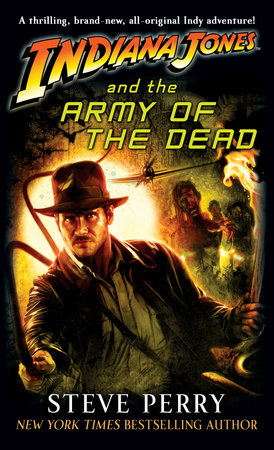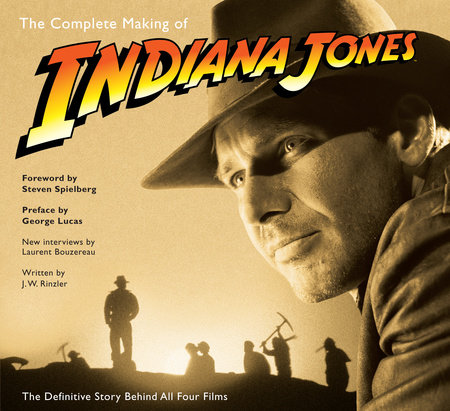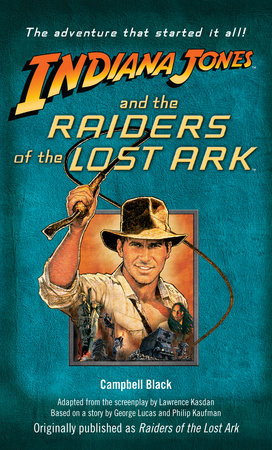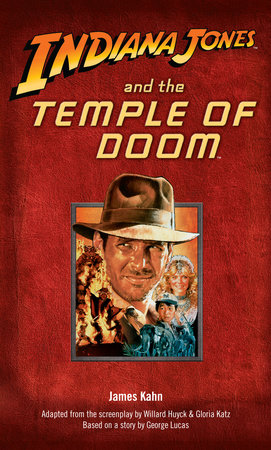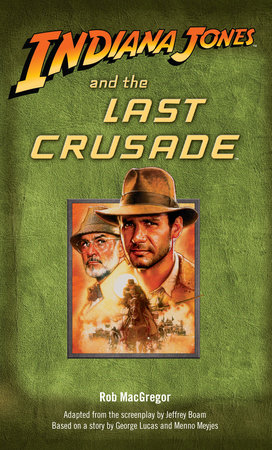Excerpt
The Adventures of Indiana Jones
Chapter 1
South America, 1936
The jungle was darkly verdant, secretive, menacing. What little sunlight broke the high barriers of branches and twisted vines was pale, milky in color. The air, sticky and solid, created a wall of humidity. Birds screamed in panic, as if they had been unexpectedly trapped in some huge net. Glittering insects scurried underfoot, animals chattered and squealed in the foliage. In its primitive quality the place might have been a lost terrain, a point unmapped, untraveled—the end of the world.
Eight men made their way slowly along a narrow trail, pausing now and then to hack at an overhanging vine or slice at a dangling branch. At the head of this group there was a tall man in a leather jacket and a brimmed felt hat. Behind him were two Peruvians, who regarded the jungle cautiously, and five nervous Quechua Indians, struggling with the pair of donkeys that carried the packs and provisions.
The man who led the group was called Indiana Jones. He was muscular in the way one might associate with an athlete not quite beyond his prime. He had several days’ growth of dirty blond beard and streaks of dark sweat on a face that might once have been handsome in a facile, photogenic fashion. Now, though, there were tiny lines around the eyes, the corners of the mouth, changing the almost bland good looks into an expression of character, depth. It was as if the contours of his experience had begun, slowly, to define his appearance.
Indy Jones didn’t move with the same caution as the two Peruvians—his confidence made it seem as if he, rather than they, were the native there. But his outward swagger did not impair his sense of alertness. He knew enough to look occasionally, almost imperceptibly, from side to side, to expect the jungle to reveal a threat, a danger, at any moment. The sudden parting of a branch or the cracking of rotted wood—these were the signals, the points on his compass of danger. At times he would pause, take off his hat, wipe sweat from his forehead and wonder what bothered him more—the humidity or the nervousness of the Quechuas. Every so often they would talk excitedly with one another in quick bursts of their strange language, a language that reminded Indy of the sounds of jungle birds, creatures of the impenetrable foliage, the recurring mists.
He looked around at the two Peruvians, Barranca and Satipo, and he realized how little he really trusted them and yet how much he was obliged to depend on them to get what he wanted out of this jungle.
What a crew, he thought. Two furtive Peruvians, five terrified Indians, and two recalcitrant donkeys. And I am their leader, who might have done better with a troop of Boy Scouts.
Indy turned to Barranca and, though he was sure he knew the answer, asked, “What are the Indians talking about?”
Barranca seemed irritated. “What do they always talk about, Señor Jones? The curse. Always the curse.”
Indy shrugged and stared back at the Indians. Indy understood their superstitions, their beliefs, and in a way he even sympathized with them. The curse—the ancient curse of the Temple of the Chachapoyan Warriors. The Quechuas had been raised with it; it was intrinsic to their system of beliefs.
He said, “Tell them to be quiet, Barranca. Tell them no harm will come to them.” The salve of words. He felt like a quack doctor administering a dose of an untested serum. How the devil could he know that no harm would come to them?
Barranca watched Indy a moment, then he spoke harshly to the Indians, and for a time they were silent—a silence that was one of repressed fear. Again, Indy felt sympathy for them: vague words of comfort couldn’t dispose of centuries of superstition. He put his hat back on and moved slowly along the trail, assailed by the odors of the jungle, the scents of things growing and other things rotting, ancient carcasses crawling with maggots, decaying wood, dying vegetation. You could think of better places to be than here, he thought, you could think of sweeter places.
And then he was wondering about Forrestal, imagining him coming along this same path years ago, imagining the fever in Forrestal’s blood when he came close to the Temple. But Forrestal, good as he had been as an archaeologist, hadn’t come back from his trip to this place—and whatever secrets that lay contained in the Temple were locked there still. Poor Forrestal. To die in this godforsaken place was a hell of an epitaph. It wasn’t one Indy relished for himself.
He moved along the trail again, followed by the group. The jungle lay in a canyon at this point, and the trail traversed the canyon wall like an old scar. There were thin mists rising from the ground now, vapors he knew would become thicker, more dense, as the day progressed. The mists would be trapped in this canyon almost as if they were webs spun by the trees themselves.
A huge macaw, gaudy as a fresh rainbow, screamed out of the underbrush and winged into the trees, momentarily startling him. And then the Indians were jabbering again, gesticulating wildly with their hands, prodding one another. Barranca turned and silenced them with a fierce command—but Indy knew it was going to be more and more difficult to keep them under any kind of control. He could feel their anxieties as certainly as he could the humidity pressing against his flesh.
Besides, the Indians mattered less to him than his growing mistrust of the two Peruvians. Especially Barranca. It was a gut instinct, the kind he always relied on, an intuition he’d felt for most of the journey. But it was stronger now. They’d cut his throat for a few salted peanuts, he knew.
It isn’t much farther, he told himself.
And when he realized how close he was to the Temple, when he understood how near he was to the Idol of the Chachapoyans, he experienced the old adrenaline rushing through him: the fulfillment of a dream, an old oath he’d taken for himself, a pledge he’d made when he’d been a novice in archaeology. It was like going back fifteen years into his past, back to the familiar sense of wonder, the obsessive urge to understand the dark places of history, that had first excited him about archaeology. A dream, he thought. A dream taking shape, changing from something nebulous to something tangible. And now he could feel the nearness of the Temple, feel it in the hollows of his bones.
He paused and listened to the Indians chatter again. They too know. They know how close we are now. And it scares them. He moved forward. Through the trees there was a break in the canyon wall. The trail was almost invisible: it had been choked by creepers, stifled by bulbous weeds that crawled over roots—roots that had the appearance of growths produced by some floating spores randomly drifting in space, planting themselves here by mere whim. Indy hacked, swinging his arm so that his broad-bladed knife cracked through the obstructions as if they were nothing more than fibrous papers. Damn jungle. You couldn’t let nature, even at its most perverse, its most unruly, defeat you. When he paused he was soaked in sweat and his muscles ached. But he felt good as he looked at the slashed creepers, the severed roots. And then he was aware of the mist thickening, not a cold mist, not a chill, but something created out of the sweat of the jungle itself. He caught his breath and moved through the passage.
He caught it again when he reached the end of the trail.
It was there.
There, in the distance, shrouded by thick trees, the Temple.
For a second he was seized by the strange linkages of history, a sense of permanence, a continuum that made it possible for someone called Indiana Jones to be alive in the year 1936 and see a construction that had been erected two thousand years before. Awed. Overwhelmed. A humbling feeling. But none of these descriptions was really accurate. There wasn’t a word for this excitement.
For a time he couldn’t say anything.
He just stared at the edifice and wondered at the energy that had gone into building such a structure in the heart of a merciless jungle. And then he was shaken back into an awareness of the present by the shouts of the Indians, and he swung round to see three of them running back along the trail, leaving the donkeys. Barranca had his pistol out and was leveling it to fire at the fleeing Indians, but Indy gripped the man’s wrist, twisted it slightly, swung the Peruvian around to face him.
“No,” he said.
Barranca stared at Indy accusingly. “They are cowards, Señor Jones.”
“We don’t need them,” Indy said. “And we don’t need to kill them.”
The Peruvian brought the pistol to his side, glanced at his companion Satipo and looked back at Indy again. “Without the Indians, Señor, who will carry the supplies? It was not part of our arrangement that Satipo and I do menial labor, no?”
Indy watched the Peruvian, the dark coldness at the heart of the man’s eyes. He couldn’t ever imagine this one smiling. He couldn’t imagine daylight finding its way into Barranca’s soul. Indy remembered seeing such dead eyes before: on a shark. “We’ll dump the supplies. As soon as we get what we came here for, we can make it back to the plane by dusk. We don’t need supplies now.”
Barranca was fidgeting with his pistol.
A trigger-happy fellow, Indy thought. Three dead Indians wouldn’t make a bit of difference to him.
“Put the gun away,” Indy told him. “Pistols don’t agree with me, Barranca, unless I’m the one with my finger on the trigger.”
Barranca shrugged and glanced at Satipo; some kind of silent communication passed between them. They’ll choose their moment, Indy knew. They’ll make their move at the right time.
“Just tuck it in your belt, okay?” Indy asked. He looked briefly at the two remaining Indians, herded into place by Satipo. They had trancelike expressions of fear on their faces; they might have been zombies.
Indy turned toward the Temple, gazing at it, savoring the moment. The mists were becoming denser around the place, a conspiracy of nature, as if the jungle intended to keep its secrets forever.
Satipo bent and pulled something out of the bark of a tree. He raised his hand to Indy. In the center of the palm lay a tiny dart.
“Hovitos,” Satipo said. “The poison is still fresh—three days, Señor Jones. They must be following us.”
“If they knew we were here, they’d have killed us already,” Indy said calmly.
He took the dart. Crude but effective. He thought of the Hovitos, their legendary fierceness, their historic attachment to the Temple. They were superstitious enough to stay away from the Temple itself, but definitely jealous enough to kill anybody else who went there.
“Let’s go,” he said. “Let’s get it over with.”
They had to hack and slash again, cut and slice through the elaborately tangled vines, rip at the creepers that rose from underfoot like shackles lying in wait. Sweating, Indy paused; he let his knife dangle at his side. From the corner of his eye he was conscious of one of the Indians hauling back a thick branch.
It was the scream that made him swing abruptly round, his knife raised in the air now. It was the wild scream of the Indian that made him rush toward the branch just as the Quechua, still yelling, dashed off into the jungle. The other remaining Indian followed, crashing mindlessly, panicked, against the barbed branches and sharp creepers. And then they were both gone. Indy, knife poised, hauled back the branch that had so scared the Indians. He was ready to lunge at whatever had terrified them, ready to thrust his blade forward. He drew the branch aside.
It sat behind the swirling mist. Carved out of stone, timeless, its face the figment of some bleak nightmare, it was a sculpture of a Chachapoyan demon. He watched it for a second, aware of the malevolence in its unchanging face, and he realized it had been placed here to guard the Temple, to scare off anybody who might pass this way. A work of art, he thought, and he wondered briefly about its creators, their system of beliefs, about the kind of religious awe that might inspire something so dreadful as this statue. He forced himself to put out his hand and touch the demon lightly on the shoulder.
Then he was conscious of something else, something that was more disturbing than the stone face. More eerie.
The silence.
The weird silence.
Nothing. No birds. No insects. No breeze to shake sounds out of the trees. A zero, as if everything in this place were dead. As if everything had been stilled, silenced by an ungodly, destructive hand. He touched his forehead. Cold, cold sweat. Spooks, he thought. The place is filled with spooks. This was the kind of silence you might have imagined before creation.
He moved away from the stone figure, followed by the two Peruvians, who seemed remarkably subdued.
“What is it, in the name of God?” Barranca asked.
Indy shrugged. “Ah, some old trinket. What else? Every Chachapoyan household had to have one, didn’t you know?”
Barranca looked grim. “Sometimes you seem to take this very lightly, Señor Jones.”
“Is there another way?”
The mist crawled, rolled, clawed, seeming to press the three men back. Indy peered through the vapors, staring at the Temple entrance, the elaborately primitive friezes that had yielded to vegetation with the passage of time, the clutter of shrubs, leaves, vines; but what held him more was the dark entrance itself, round and open, like the mouth of a corpse. He thought of Forrestal passing into that dark mouth, crossing the entranceway to his death. Poor guy.
Barranca stared at the entranceway. “How can we trust you, Señor Jones? No one has ever come out alive. Why should we put our faith in you?”
Indy smiled at the Peruvian. “Barranca, Barranca—you’ve got to learn that even a miserable gringo sometimes tells the truth, huh?” And he pulled a piece of folded parchment out of his shirt pocket. He stared at the faces of the Peruvians. Their expressions were transparent, such looks of greed. Indy wondered whose throats had been cut so that these two villains had managed to obtain the other half. “This, Barranca, should take care of your faith,” and he spread the parchment on the ground.
Satipo took a similar piece of parchment from his pocket and laid it alongside the one Indy had produced. The two parts dovetailed neatly. For a time, nobody spoke; the threshold of caution had been reached, Indy knew—and he waited, tensely, for something to happen.




